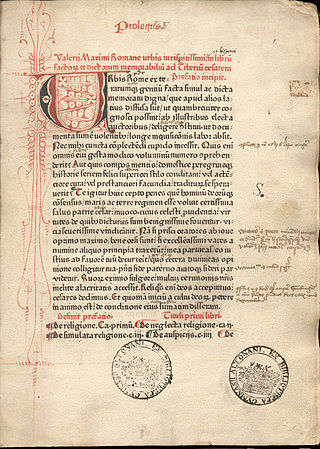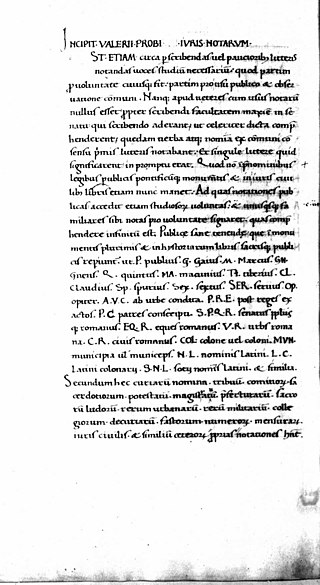Related Research Articles
Linguistics is the scientific study of language, involving analysis of language form, language meaning, and language in context.

Servius, distinguished as Servius the Grammarian, was a late fourth-century and early fifth-century grammarian. He earned a contemporary reputation as the most learned man of his generation in Italy; he authored a set of commentaries on the works of Virgil. These works, In Tria Virgilii Opera Expositio, Commentarii in Virgilium, Commentarii in Vergilii Opera, or Vergilii Carmina Commentarii, constituted the first incunable to be printed at Florence, by Bernardo Cennini, in 1471.

Valerius Maximus was a 1st-century Latin writer and author of a collection of historical anecdotes: Factorum et dictorum memorabilium libri IX. He worked during the reign of Tiberius.

Aulus Persius Flaccus was a Roman poet and satirist of Etruscan origin. In his works, poems and satires, he shows a Stoic wisdom and a strong criticism for what he considered to be the stylistic abuses of his poetic contemporaries. His works, which became very popular in the Middle Ages, were published after his death by his friend and mentor, the Stoic philosopher Lucius Annaeus Cornutus.
Quintus Remmius Palaemon or Quintus Rhemnius Fannius Palaemon was a Roman grammarian and a native of Vicentia. He lived during the reigns of Emperors Tiberius and Claudius.

Marcus Valerius Probus, also known as M. Valerius Probus Berytius or Probus the Berytian, was a Roman grammarian and critic, who flourished during Nero's reign.
Helenius Acron was a Roman commentator and grammarian, probably of the 3rd century AD, but whose precise date is not known.

Late Latin is the scholarly name for the form of Literary Latin of late antiquity. English dictionary definitions of Late Latin date this period from the 3rd to the 6th centuries CE, and continuing into the 7th century in the Iberian Peninsula. This somewhat ambiguously defined version of Latin was used between the eras of Classical Latin and Medieval Latin. Scholars do not agree exactly when Classical Latin should end or Medieval Latin should begin.
Flavius Sosipater Charisius was a Latin grammarian.
Gaius Marius Victorinus was a Roman grammarian, rhetorician and Neoplatonic philosopher. Victorinus was African by birth and experienced the height of his career during the reign of Constantius II. He is also known for translating two of Aristotle's books from ancient Greek into Latin: the Categories and On Interpretation. Victorinus had a religious conversion, from being a pagan to a Christian, "at an advanced old age".
Dositheus Magister was a Greek grammarian who flourished in Rome in the 4th century AD.
Geoffrey of Vinsauf is a representative of the early medieval grammarian movement, termed preceptive grammar for its interest in teaching the ars poetica.
The golden line is a type of Latin dactylic hexameter frequently mentioned in Latin classrooms and in contemporary scholarship about Latin poetry, but which apparently began as a verse-composition exercise in schools in early modern Britain.

Johannes de Garlandia or John of Garland was a medieval grammarian and university teacher. His dates of birth and death are unknown, but he probably lived from about 1190 to about 1270.
An ars grammatica is a generic or proper title for surveys of Latin grammar. The first ars grammatica seems to have been composed by Remmius Palaemon, but is now lost. The most famous ars grammatica since late antiquity has been that composed by Donatus.
Bhartṛhari was a Hindu linguistic philosopher to whom are normally ascribed two influential Sanskrit texts:

Gnaeus Gellius was a Roman historian. Very little is known about his life and work, which has only survived in scattered fragments. He continued the historical tradition set by Fabius Pictor of writing a year-by-year history of Rome from mythological times to his day. However, with about a hundred books, Gellius' Annales were massively more developed than the other Roman annalists, and was only surpassed by Livy's gigantic History of Rome.
The Ars Bonifacii is the title given to a Latin grammar ascribed to Saint Boniface.
The gens Velia was a minor plebeian family at ancient Rome. Members of this gens are first mentioned in the latter part of the first century AD. The first of the Velii to obtain the consulship was Decimus Velius Fidus in AD 144.
De vita sua is an autobiography written by Marcus Aemilius Scaurus, a prominent statesman of the Roman Republic, notably consul in 115 BC and princeps senatus for a generation. Even though the book is lost and has only survived in seven small fragments, it is the first known autobiography in Roman history. Scaurus wrote his autobiography in order to defend his actions throughout his long career, during which he was at the centre of Roman politics, from the tribunates of Gaius Gracchus to the Social War, and engaged in bitter feuds with numerous enemies. Most scholars think that Scaurus wrote the autobiography towards the end of his life.
References
- Dictionary of Greek and Roman Biography and Mythology (1849), v. 1, p. 1026
- "Diomedes" in Robert Kaster , Guardians of Language: The Grammarian and Society in Late Antiquity, The Transformation of the Classical Heritage, volume 11, Berkeley-Los Angeles-London: University of California Press, 1988
- This entry incorporates material from the respective 1911 Encyclopædia Britannica article